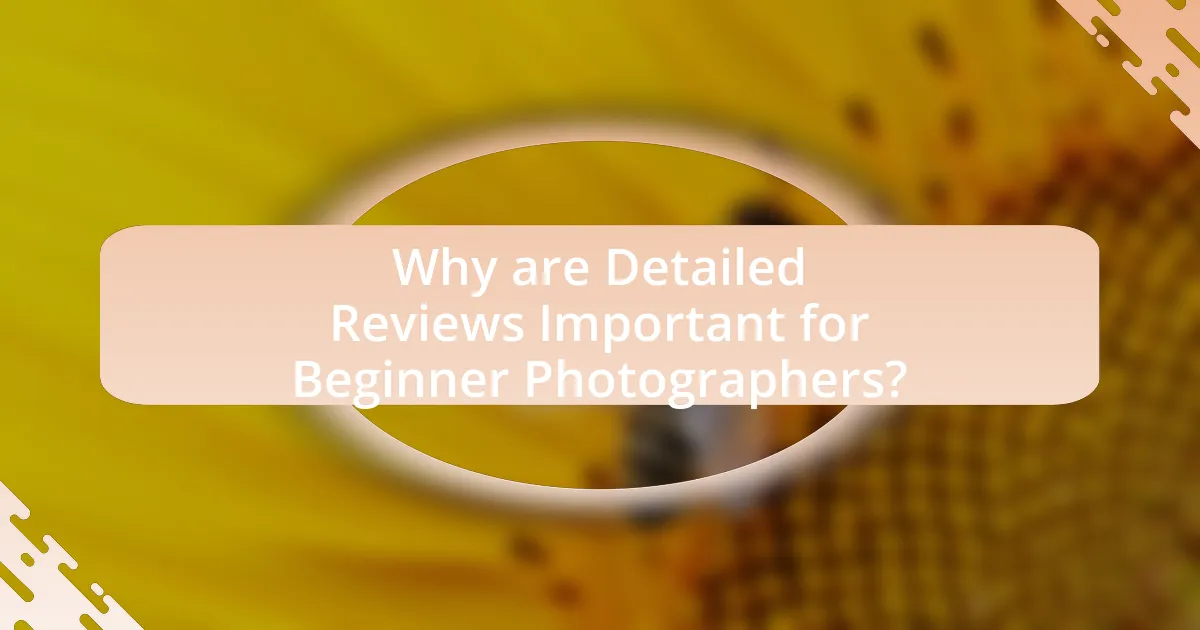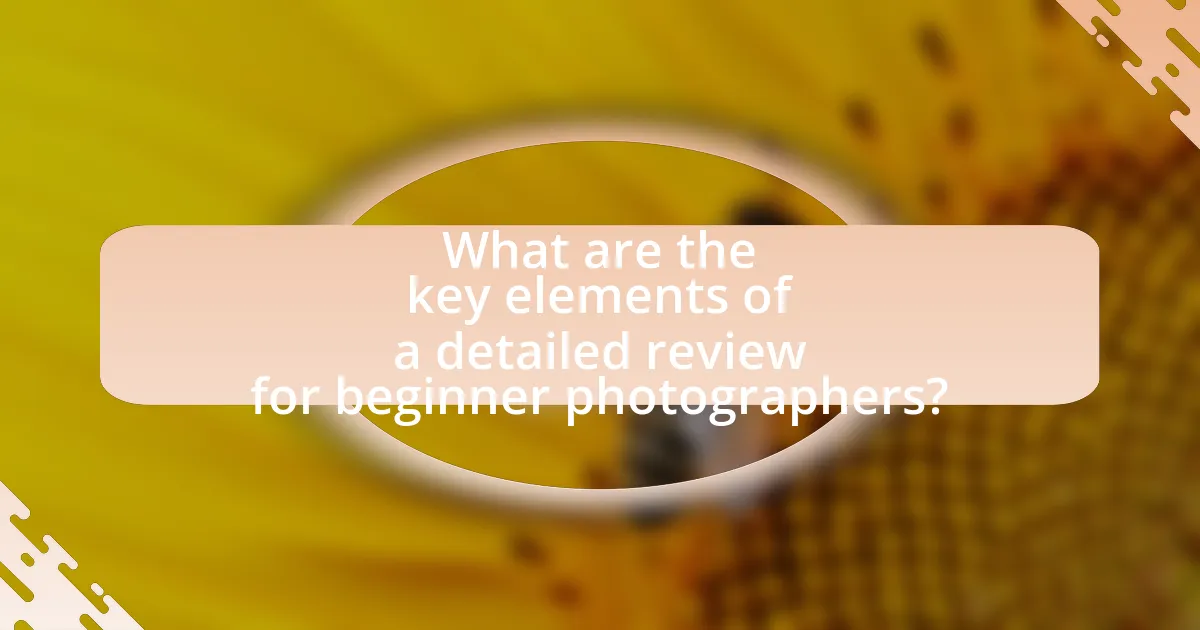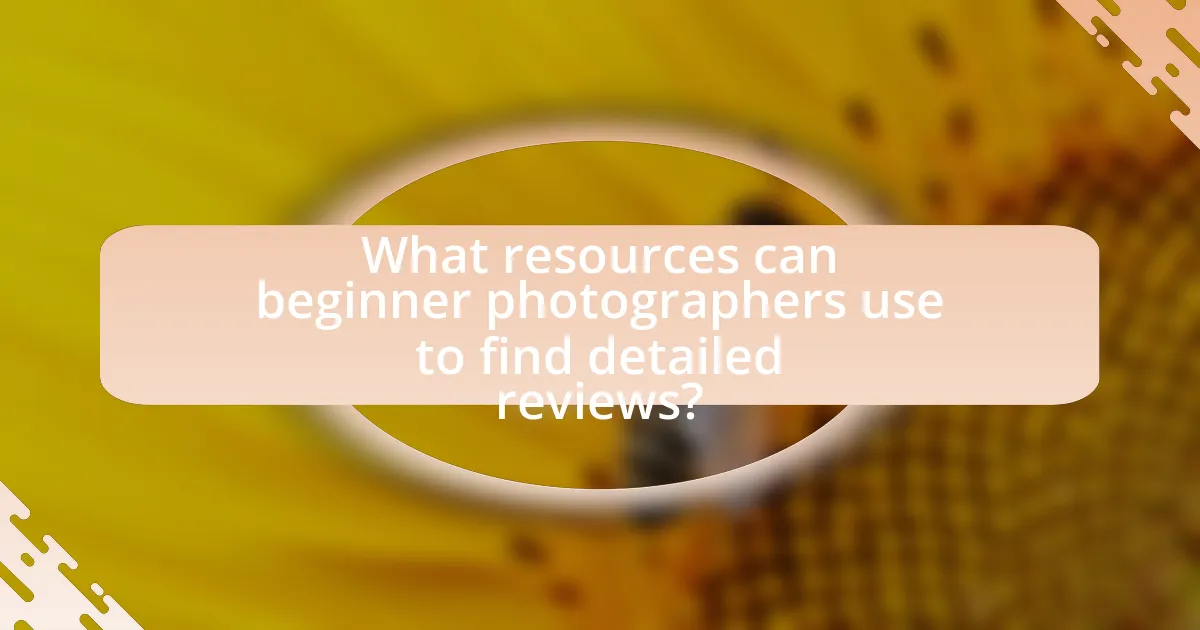The article focuses on the significance of detailed reviews for beginner photographers, emphasizing how these reviews provide essential insights into equipment, techniques, and best practices that enhance learning and skill development. It discusses the role of constructive feedback in improving technical skills, artistic vision, and overall growth in photography. Key elements of effective reviews, such as clarity, technical analysis, and practical examples, are outlined, along with the impact of peer reviews and professional resources. The article also highlights practical tips for beginners to maximize the benefits of feedback and adopt a growth mindset for continuous improvement in their craft.

Why are Detailed Reviews Important for Beginner Photographers?
Detailed reviews are important for beginner photographers because they provide comprehensive insights into equipment, techniques, and best practices that can significantly enhance learning and skill development. These reviews often include specific evaluations of camera features, lens performance, and user experiences, which help beginners make informed decisions about their purchases and understand how to utilize their gear effectively. For instance, a study by the Journal of Visual Communication in Medicine found that detailed product reviews can improve user satisfaction and knowledge retention, indicating that thorough feedback aids in the learning process.
What role do detailed reviews play in a photographer’s development?
Detailed reviews play a crucial role in a photographer’s development by providing constructive feedback that enhances technical skills and artistic vision. These reviews help photographers identify strengths and weaknesses in their work, allowing them to focus on areas needing improvement. For instance, a study published in the Journal of Visual Communication in Medicine highlights that feedback mechanisms significantly contribute to skill acquisition in creative fields, including photography. By analyzing detailed critiques, photographers can refine their techniques, understand composition better, and develop a unique style, ultimately leading to professional growth and increased confidence in their abilities.
How can detailed reviews enhance technical skills in photography?
Detailed reviews enhance technical skills in photography by providing specific feedback on composition, exposure, and post-processing techniques. These reviews often highlight areas for improvement, allowing photographers to understand their mistakes and learn from them. For instance, a review may point out improper use of lighting or focus, which can lead to better decision-making in future shoots. Additionally, detailed critiques often include examples of successful techniques, enabling photographers to visualize effective practices. This targeted learning approach is supported by studies showing that feedback significantly improves skill acquisition in creative fields.
What impact do detailed reviews have on creative expression?
Detailed reviews significantly enhance creative expression by providing constructive feedback that helps artists refine their skills and vision. When beginner photographers receive specific critiques on their work, they gain insights into technical aspects, composition, and emotional impact, which can lead to improved artistic choices. Research indicates that feedback fosters a growth mindset, encouraging individuals to experiment and innovate in their creative processes. For instance, a study published in the Journal of Creative Behavior found that artists who engaged with detailed critiques reported higher levels of creative confidence and willingness to take risks in their work. This demonstrates that detailed reviews not only inform but also inspire photographers to explore new avenues of expression.
How do detailed reviews influence learning and improvement?
Detailed reviews significantly enhance learning and improvement by providing specific feedback that identifies strengths and weaknesses in a photographer’s work. This targeted feedback allows beginner photographers to understand what techniques are effective and which areas require further development. Research indicates that feedback, particularly when detailed, leads to a 20% increase in skill acquisition and retention, as it helps learners to make informed adjustments to their practice. By analyzing detailed reviews, photographers can refine their technical skills, composition, and overall artistic vision, ultimately accelerating their growth in the field.
What specific aspects of photography can be improved through detailed reviews?
Detailed reviews can improve technical skills, composition, and post-processing techniques in photography. Technical skills, such as understanding exposure settings and camera functions, can be enhanced through constructive feedback that identifies specific areas for improvement. Composition can be refined by analyzing elements like framing, balance, and the rule of thirds, which detailed reviews often highlight. Additionally, post-processing techniques, including color correction and image enhancement, can be improved as reviewers provide insights into effective software use and editing styles. Research indicates that feedback significantly boosts learning outcomes, making detailed reviews a valuable tool for beginner photographers seeking to elevate their craft.
How do beginner photographers benefit from constructive criticism?
Beginner photographers benefit from constructive criticism by gaining valuable insights that enhance their skills and artistic vision. Constructive criticism provides specific feedback on technical aspects such as composition, lighting, and exposure, allowing photographers to identify areas for improvement. Research indicates that feedback can significantly accelerate learning; for instance, a study published in the Journal of Educational Psychology found that students who received constructive feedback improved their performance by up to 30%. This process not only helps beginners refine their techniques but also encourages them to develop a critical eye for their own work, fostering growth and confidence in their photography journey.

What are the key elements of a detailed review for beginner photographers?
The key elements of a detailed review for beginner photographers include clarity, constructive feedback, technical analysis, and practical examples. Clarity ensures that the review is easily understandable, allowing beginners to grasp concepts without confusion. Constructive feedback provides specific suggestions for improvement, fostering growth in their skills. Technical analysis involves evaluating aspects such as composition, exposure, and lighting, which are crucial for developing a solid foundation in photography. Practical examples illustrate points made in the review, helping beginners visualize the concepts in real-world scenarios. These elements collectively enhance the learning experience for novice photographers, enabling them to progress effectively in their craft.
What should be included in a comprehensive photography review?
A comprehensive photography review should include an evaluation of image quality, technical performance, usability, and value for money. Image quality encompasses aspects such as sharpness, color accuracy, and dynamic range, which are critical for assessing a camera or lens’s capabilities. Technical performance involves analyzing autofocus speed, low-light performance, and burst shooting capabilities, providing insights into how well the equipment performs under various conditions. Usability covers the ergonomics, menu navigation, and overall user experience, which are essential for beginner photographers who may prioritize ease of use. Finally, value for money assesses whether the features and performance justify the price, helping beginners make informed purchasing decisions.
How do composition and lighting factor into a photography review?
Composition and lighting are critical elements in a photography review as they directly influence the visual impact and storytelling of an image. Composition refers to the arrangement of visual elements within the frame, guiding the viewer’s eye and creating balance, while lighting affects mood, clarity, and detail. For instance, a well-composed photograph with effective lighting can evoke emotions and highlight the subject, making it more engaging. Studies show that images with strong composition and lighting are more likely to be perceived as professional and aesthetically pleasing, which is essential for beginner photographers to understand in order to improve their skills and create compelling work.
What technical aspects should be evaluated in a review?
The technical aspects that should be evaluated in a review include image quality, exposure accuracy, color reproduction, focus precision, and lens performance. Image quality assesses sharpness and detail, while exposure accuracy evaluates how well the camera captures light in various conditions. Color reproduction examines the fidelity of colors in the images, and focus precision determines the effectiveness of autofocus systems. Lens performance looks at distortion, chromatic aberration, and bokeh quality. These aspects are critical for beginner photographers to understand the capabilities and limitations of their equipment, ensuring informed decisions in their photography journey.
How can feedback be effectively communicated in reviews?
Feedback can be effectively communicated in reviews by being specific, constructive, and balanced. Specific feedback focuses on particular aspects of the work, such as composition or lighting, which helps the photographer understand what to improve. Constructive feedback provides actionable suggestions rather than just criticism, guiding the photographer on how to enhance their skills. Balanced feedback includes both positive observations and areas for improvement, which fosters motivation and encourages growth. Research indicates that specific and constructive feedback leads to better learning outcomes, as it clarifies expectations and promotes skill development.
What are the best practices for providing constructive feedback?
The best practices for providing constructive feedback include being specific, focusing on behavior rather than personal attributes, and offering actionable suggestions for improvement. Specific feedback helps the recipient understand exactly what aspects need attention, while focusing on behavior ensures that the feedback is objective and not perceived as a personal attack. For instance, instead of saying “your photos are bad,” a more constructive approach would be “the lighting in your photos could be improved to enhance the subject.” Additionally, providing actionable suggestions, such as “try using natural light during the golden hour,” empowers the recipient to make tangible changes. Research indicates that constructive feedback, when delivered effectively, can lead to improved performance and learning outcomes, particularly in skill-based areas like photography.
How can beginner photographers interpret feedback for growth?
Beginner photographers can interpret feedback for growth by actively analyzing the comments and critiques they receive on their work. This involves categorizing feedback into specific areas such as composition, lighting, and subject matter, allowing them to identify patterns and recurring themes. For instance, if multiple reviewers highlight issues with lighting, the photographer can focus on improving their understanding of exposure and lighting techniques. Research indicates that constructive criticism can enhance skill development; a study published in the Journal of Educational Psychology found that feedback significantly improves performance when it is specific and actionable. By embracing this approach, beginner photographers can effectively leverage feedback to refine their skills and advance their artistic vision.

What resources can beginner photographers use to find detailed reviews?
Beginner photographers can use websites like DPReview, Photography Life, and PetaPixel to find detailed reviews. These platforms provide comprehensive analysis and comparisons of cameras, lenses, and accessories, often including user feedback and expert opinions. For instance, DPReview is known for its in-depth technical reviews and sample images, while Photography Life offers guides and tutorials alongside product reviews. PetaPixel features news and reviews that highlight the latest trends and technologies in photography gear. These resources are widely recognized in the photography community for their reliability and thoroughness, making them valuable for beginners seeking informed purchasing decisions.
Where can beginner photographers access peer reviews?
Beginner photographers can access peer reviews on platforms such as photography forums, social media groups, and dedicated photography websites. Websites like Flickr and 500px allow users to share their work and receive feedback from other photographers. Additionally, communities on Reddit, such as r/photography, provide a space for users to post their images and solicit critiques. These platforms facilitate interaction among photographers, enabling beginners to gain insights and improve their skills through constructive feedback.
What online platforms are best for sharing and reviewing photography?
The best online platforms for sharing and reviewing photography are Flickr, 500px, and Instagram. Flickr offers a large community for photographers to upload, share, and receive feedback on their work, with features like groups and forums that facilitate detailed reviews. 500px is known for its high-quality photography and allows users to critique and comment on each other’s work, fostering a constructive environment for improvement. Instagram, while primarily a social media platform, provides a vast audience for photographers to showcase their work and receive immediate feedback through likes and comments. These platforms are widely recognized in the photography community for their ability to connect photographers and facilitate meaningful critiques.
How can social media be utilized for receiving feedback?
Social media can be utilized for receiving feedback by creating interactive posts that encourage audience engagement and soliciting opinions directly. Platforms like Instagram and Facebook allow photographers to share their work and ask specific questions in captions or comments, prompting followers to provide constructive criticism. Research indicates that 79% of consumers prefer to engage with brands on social media, highlighting its effectiveness as a feedback tool. Additionally, using polls and surveys on platforms such as Twitter and Instagram Stories can yield immediate responses, facilitating real-time feedback from a diverse audience.
What professional resources are available for detailed photography reviews?
Professional resources available for detailed photography reviews include websites like DPReview, which offers comprehensive camera and lens reviews, and Photography Life, known for in-depth articles and tutorials. Additionally, professional magazines such as Popular Photography and Outdoor Photographer provide expert insights and product evaluations. These resources are recognized for their thorough testing methodologies and expert opinions, making them reliable for beginner photographers seeking detailed information.
How can workshops and photography classes enhance review experiences?
Workshops and photography classes enhance review experiences by providing structured learning environments where beginners can receive immediate feedback on their work. This direct interaction with instructors and peers allows for constructive critiques that help photographers understand their strengths and areas for improvement. Research indicates that hands-on learning, such as that found in workshops, significantly increases retention of skills and concepts, leading to more informed and detailed reviews of their own and others’ work. Additionally, the collaborative atmosphere fosters a sense of community, encouraging participants to share insights and perspectives that enrich the review process.
What role do photography forums play in providing detailed reviews?
Photography forums serve as platforms for users to share detailed reviews of equipment, techniques, and experiences, which are invaluable for beginner photographers. These forums facilitate discussions where members can post in-depth analyses, personal insights, and comparative evaluations of various photography gear, such as cameras and lenses. The collective knowledge and diverse perspectives found in these forums enhance the quality of reviews, making them more comprehensive and relatable for novices. Additionally, statistics indicate that user-generated content on forums often leads to more trustworthy reviews, as they reflect real-world usage rather than marketing claims. This peer-to-peer interaction fosters a community where beginners can ask questions and receive tailored advice, further enriching their learning experience.
What are some practical tips for beginners to maximize the benefits of reviews?
To maximize the benefits of reviews, beginners should actively seek out detailed and constructive feedback on their photography work. Engaging with reviews allows photographers to identify strengths and weaknesses in their techniques, which is crucial for improvement. For instance, analyzing specific comments about composition or lighting can lead to targeted practice in those areas. Additionally, beginners should compare their work against industry standards by referencing professional critiques or established photography guidelines, which can provide a benchmark for quality. Utilizing platforms that encourage peer reviews, such as photography forums or social media groups, can also enhance learning through diverse perspectives.
How can beginner photographers prepare their work for reviews?
Beginner photographers can prepare their work for reviews by organizing their portfolio, selecting their best images, and providing context for each photograph. Organizing the portfolio involves categorizing images by themes or styles, which helps reviewers understand the photographer’s vision. Selecting the best images ensures that only high-quality work is presented, as studies show that first impressions significantly impact feedback. Providing context, such as the story behind each image or the techniques used, enhances the reviewer’s understanding and appreciation of the work. This approach aligns with best practices in visual arts, where clarity and intention are crucial for effective critique.
What mindset should beginners adopt when receiving feedback?
Beginners should adopt a growth mindset when receiving feedback. This mindset encourages individuals to view feedback as an opportunity for learning and improvement rather than as criticism. Research by Carol Dweck, a psychologist at Stanford University, emphasizes that individuals with a growth mindset are more likely to embrace challenges and persist in the face of setbacks, which is crucial for skill development in photography. By understanding that feedback is a valuable tool for enhancing their craft, beginners can cultivate resilience and adaptability, ultimately leading to greater artistic growth and proficiency.